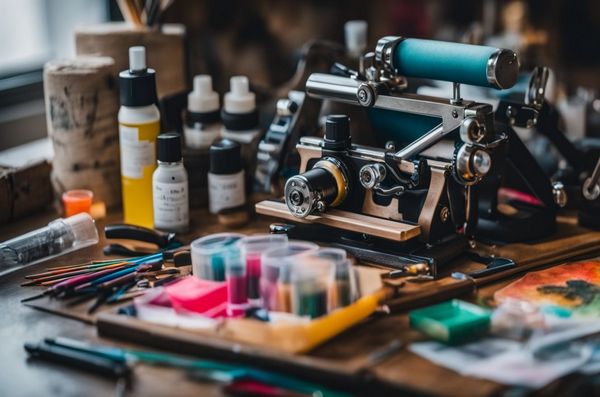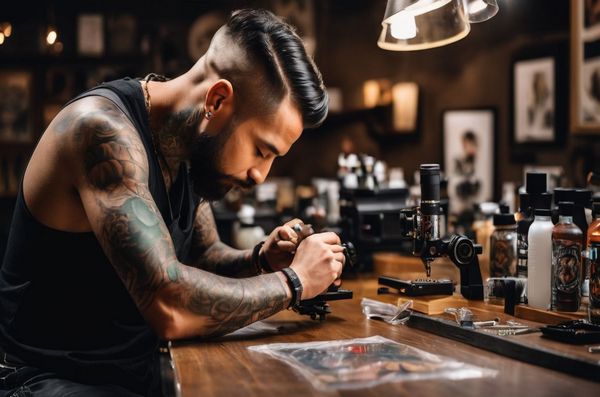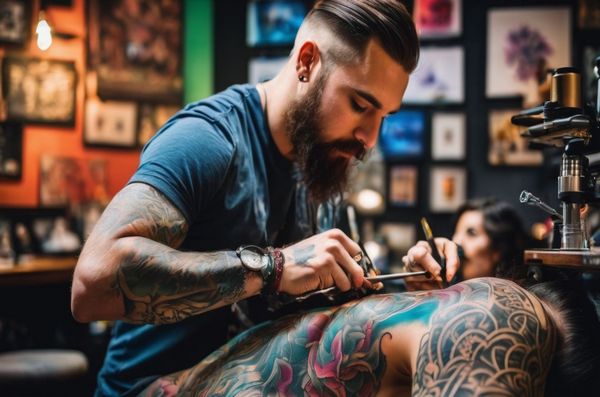Introducing yourself to the world of tattooing can be an intimidating task. Did you know that it is not a requirement to attend school in order to become a professional tattoo artist. Now are you thinking on how to become a tattoo artist?
Don’t worry! This post will guide you through the steps and processes necessary to develop your skills, obtain certifications, and find success in this creative career path.
With commitment come rewards – if you’re willing put forth the effort required, you’ll be on your way to becoming a talented tattooist. Let’s get started today right here!
How To Become A Tattoo Artist

Acquiring artistry and creativity, obtaining training and education, as well as demonstrating professional portfolio are the initial steps for one to become a tattoo artist.
1. Develop Artistic Skills
Having strong artistic skills is essential for successful tattoo artistry. Professional tattoo artists must be able to create unique visual artwork, and having good drawing abilities allows them to add their own style and expression to designs.
Creating visually appealing tattoos involves using color theory, shading techniques, creative composition, and other design elements which are learned through art education or practice over time.
Taking art classes or workshops can allow aspiring tattoo artists to hone in on these skillsets needed for great tattoos as well as offer an opportunity to refine one’s personal vision of what makes a truly exceptional piece of body art.
It is also important that an artist has the ability to accurately reproduce artwork from references so they can faithfully capture customer requests while still putting their own spin on the design with creative compositions and refined details.
2. Obtain Training and Education
Becoming a professional tattoo artist requires training and education. An apprenticeship is the traditional path for learning the trade, as it provides experience under the guidance of an experienced tattoo artist.
Some states or counties may require a high school diploma and completion of an apprenticeship in order to become licensed. Apprenticeships provide hands-on focused instruction, which can be invaluable when starting out in this field.
However, they also come with rules set by the teacher/mentor who might limit creativity or growth potential due to their preferences or limited knowledge base compared to what’s available today in modern technologies and trends.
For those not able to find an apprenticeship program, another option is self-teaching through online courses and resources that focus on teaching drawing skills applicable to tattoos – but you will still likely need some form of certification or licensing from your state or county before beginning work as a tattoo artist professionally.
Finally, many states offer formal schools where aspiring artists can get educated; these include classroom time done alongside studio experience & internships which offer real-world application opportunities plus a host of certifications upon completion (all dependent on local laws).
3. Build a Strong Portfolio
Having a portfolio is essential to establish yourself as an artist and increase your chances of getting an apprenticeship with experienced tattoo artists. A good starting point is to create an online portfolio that displays the different types of artwork you have produced, such as paintings, drawings, sketches, or even tattoos you’ve made on yourself or friends.
This will help potential employers get a better understanding of your style and creativity before they decide whether to take you on for training.
When creating your portfolio it is important to demonstrate technical skill in various mediums so the viewer has insight into existing skillsets but also understand what direction they can be developed in further.
Also include relevant qualifications like a degree in fine arts or illustration training — these show initiative into learning how art works professionally instead of just winging it.
How to Transition into a Professional Tattoo Artist

After gaining the appropriate skills and credentials, aspiring tattoo artists can take steps towards becoming a professional.
1. Find a Mentor or Apprenticeship
Tattoo apprenticeships provide a great opportunity to learn safe tattooing methods from experienced mentors. It is essential for the process of becoming a professional tattoo artist and offers many benefits such as learning sterile techniques, proper shade management, client relations and more.
- Many reputable shops offer informal apprenticeships which involve working close with an established artist over an extended period of time without payment. Other shops may require aspiring artists to pay certain fees before being accepted in their program. It is important to research shop policies ahead of time when considering an apprenticeship opportunity.
- While no specific degree or certification needed for most traditional apprentice programs, it may be beneficial to have additional education depending on increasing career ambition or advancement opportunities down the road. Furthermore obtaining Inksmith & Rogers standard bloodborne pathogen certification can also give aspiring artists the added edge they need in differentiating themselves from other applicants in the field.
- Establish personal relationships with local tattoo artists who can act as references during job searches, suggesting promising leads towards successful careers by providing invaluable adviceand knowledge about necessary certifications that may otherwise not be available through published resources
2. Obtain Certifications and Licenses
Individuals transitioning into a professional career as a tattoo artist will need to gain certifications and licenses in their state. Requirements vary depending on the individual’s location, but states often require at least a high school diploma or GED and an apprenticeship that leads to certification. It is essential for those beginning careers in tattooing to become thoroughly familiar with local laws related to professional tattooing.
3. Establish a Professional Career in a Tattoo Shop
In order to make a career out of tattooing, it’s important that aspiring tattoo artists follow certain steps. Finding a mentor or an apprenticeship is essential for those wanting to enter the profession – receiving guidance and valuable insight from experienced professionals will help you quickly develop necessary skills as well as provide insights into the industry.
It is also important to obtain certifications and licenses where appropriate; each state has its own guidelines on how one must be certified. Finally, gaining experience in reputable shops provides individuals the ability to practice their craft while demonstrating their skillset.
Obtaining these various aspects can make all the difference between simply offering tattoos versus truly advancing one’s tattoo artistry career.
Conclusion
Being an accomplished and successful tattoo artist requires a combination of artistic skills, proper training and education, strong portfolio building, appropriate licensing processes, finding the right mentorship or apprenticeship opportunities, and networking within industry circles.
Tattoo artists need to have well-rounded skills in drawing as it is imperative for forming great tattoos. Additionally they must obtain legal certifications as per local rules and regulations while transitioning into a professional career at a tattoo shop with successful marketing tactics.
All these factors play an important role in establishing oneself as an experienced artist amongst peers. Ultimately having passion for art combined with technical know-how could help take one up the ladder of success within the industry.
Frequently Asked Questions (FAQs)
How do I become a tattoo artist?
To become a tattoo artist, you will need to complete an apprenticeship under an experienced professional and obtain the necessary licensing from your state or country.
What degree do I need to be a tattoo artist?
You don't need a degree. Focus on your art portfolio and apprenticeship instead.
Should I go to tattoo school?
Going to a respected tattoo school can teach useful skills. But an apprenticeship is most important.
How can I find a tattoo apprenticeship?
Research shops online and in person. Be persistent and keep applying. Offer to clean the studio for experience.
What skills are important for a tattoo artist?
You need great art abilities and client care. Being comfortable with needles helps too.
Do I need any art experience before becoming a tattoo artist?
Yes, prior experience with painting, drawing, graphic design or sculpting can be helpful when learning how to make tattoos professionally.

